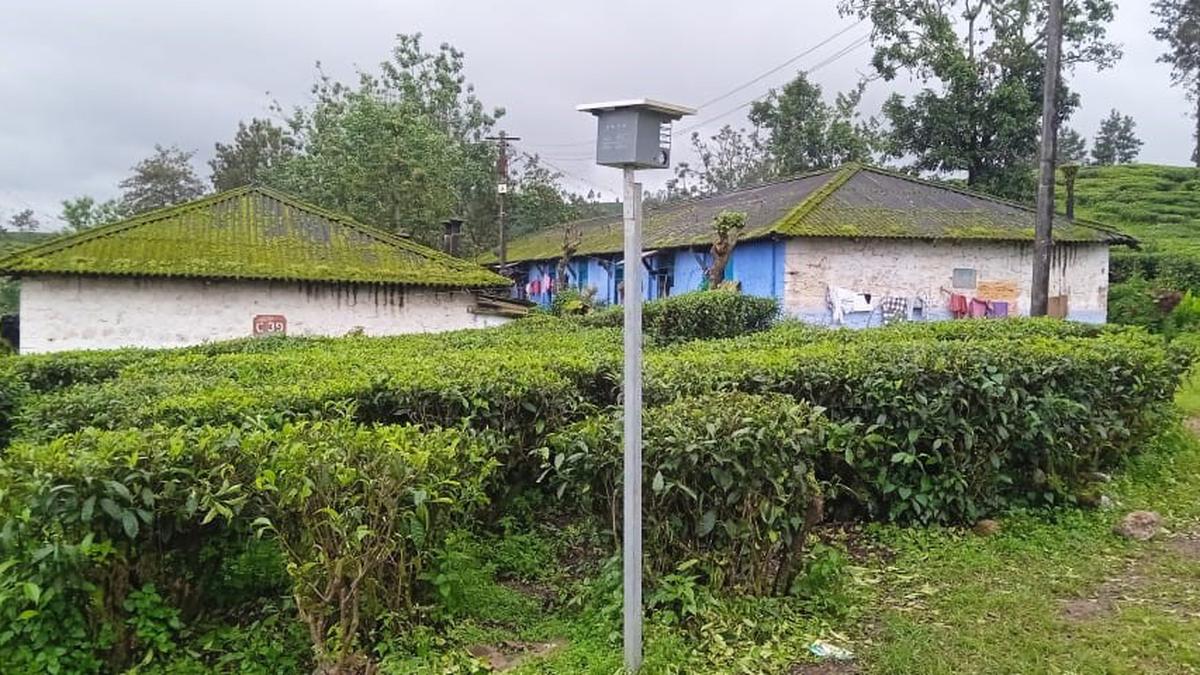
A pole of the smart virtual fencing system near a quarters of workers in a tea estate at Manambolly forest range in Valparai.
| Photo Credit: Special Arrangement
The smart virtual fencing system introduced by the Forest Department at two forest ranges of the Anamalai Tiger Reserve (ATR) in the Valparai plateau last year has proven effective, resulting in better coexistence of humans and elephants.
D. Venkatesh, Chief Conservator of Forests and Field Director of ATR, said no major incidents of human – elephant conflicts occurred in places where the smart virtual fencing system was introduced under the Tamil Nadu Innovation Initiatives (TANII), in the past year.
The system comprises solar-powered infrared devices mounted on poles, which generate alarm by detecting movement of elephants. People are advised to remain in their residences when a device triggers an alarm as it indicates the presence of a wild elephant nearby. Of the 1,300 devices installed by the Department, 600 are in Manambolly forest range and 700 in Valparai range.
“The devices were installed at places where incidents of human – elephant conflicts occurred before. These areas are not witnessing conflicts after the system’s introduction. This can be replicated in other places where incidents of conflicts between humans and elephants are high,” said Mr. Venkatesh.
Three persons died in elephant attacks after the introduction of the smart virtual fencing system. In two incidents, both reported in Manambolly range, the victims were aware of the presence of elephants outside their residence. They had fatal encounters with elephants when they came out of their residences. The third death was of a German tourist, who had a fatal attack by an elephant when he tried to cross the animal in his motorcycle at Tiger Valley near Valparai, despite being warned by other motorists.
As elephants get habituated to the same type of alarms and warning lights, the devices are designed to generate varying combinations of sounds and flickering of lights.

“The system detects the presence of elephants, but it does not deter the animal. Hence, when people hear the alarm, they should be aware that an elephant is in the vicinity. They should not come out of their residences out of curiosity. They need to stay inside and be cautious as elephants usually vacate the place after sometime,” said Ganesh Raghunathan, Senior Programme Manager with the Nature Conservation Foundation (NCF).
He also pointed out that regular maintenance of the solar-powered system, including clearing algae from the panel, needs to be ensured to retain its efficiency and long-term functioning. Also, field staff should continue to create awareness among residents and estate workers about the terrain, its wildlife and the dos and don’ts, as new migrant workers keep coming for jobs in estates, he opined.
NCF is operating its own early warning system comprising SMS alerts, warning lights ,and alerts on local cable TV channels in the Valparai platueau for the past several years.
Published – August 03, 2025 10:06 pm IST



